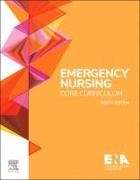Read more
Expand your emergency nursing knowledge and skills with this essential resource!
Emergency Nursing Core Curriculum, 8th Edition, presents a clear, concise, and thorough overview of emergency nursing. Authored by the Emergency Nurses Association (ENA), this edition includes new, updated, and expanded information on cardiovascular disease, COVID-19, mental health issues, disaster preparedness and response, and more. This core curriculum also serves as an invaluable resource when preparing for the Certification for Emergency Nurses (CEN) examination. Used by practicing emergency nurses at all levels, this highly respected resource is essential for gaining knowledge, developing practice standards, and improving quality of care.
- Expert content is authored by the Emergency Nurses Association
- User-friendly, outline format provides quick access to essential information
- Alphabetical listing of the Clinical Emergencies chapters makes it easy to find specific content
- Detailed tables offer at-a-glance access to key data and insights
- NEW! Current coverage brings you the latest information on cardiovascular disease, COVID-19/SARS, mental health issues, the AHA's ACLS and heart guidelines, and disaster preparedness and response.
List of contents
Part 1: Clinical Foundations1. Nursing Assessment and Resuscitation
2. Triage
3. Palliative and End-of-Life Care
4. Hemodynamic Monitoring
5. Pain Management
6. Isolation and Personal Protective Equipment
7. Workplace Violence in Emergency Care
8. Considerations for the Transgender and Gender-Expansive Patient
Part 2: Clinical Emergencies9. Abdominal Emergencies
10. Cardiovascular Emergencies
11. Endocrine Emergencies
12. Environmental Emergencies
13. Fluid and Electrolyte Abnormalities
14. Genitourinary Emergencies
15. Head and Neck Emergencies
16. Hematologic/Oncologic Emergencies
17. Communicable and Infectious Disease Emergencies
18. Medical Emergencies
19. Neurologic Emergencies
20. Obstetric and Gynecologic Emergencies
21. Orthopedic Emergencies
22. Psychiatric/Psychosocial Emergencies
23. Respiratory and Airway Emergencies
24. Shock Emergencies
25. Toxicologic Emergencies
Part 3: Trauma Emergencies26. Mechanism of Injury
27. Nursing Assessment and Trauma Resuscitation
28. Abdominal, Pelvic, and Genitourinary Trauma
29. Burn and Surface Trauma
30. Neurologic Trauma
31. Ocular and Maxillofacial Trauma
32. Obstetric Trauma
33. Musculoskeletal Trauma
34. Thoracic Trauma
Part 4: Professional Components35. Disaster Preparedness and Response
36. Education: Professional, Patient, and Community
37. Emergency Patient Transfer and Transport
38. Forensic Aspects of Emergency Nursing
39. Legal and Regulatory Issues
40. Professionalism and Leadership
41. Research and Evidence-Based Practice

